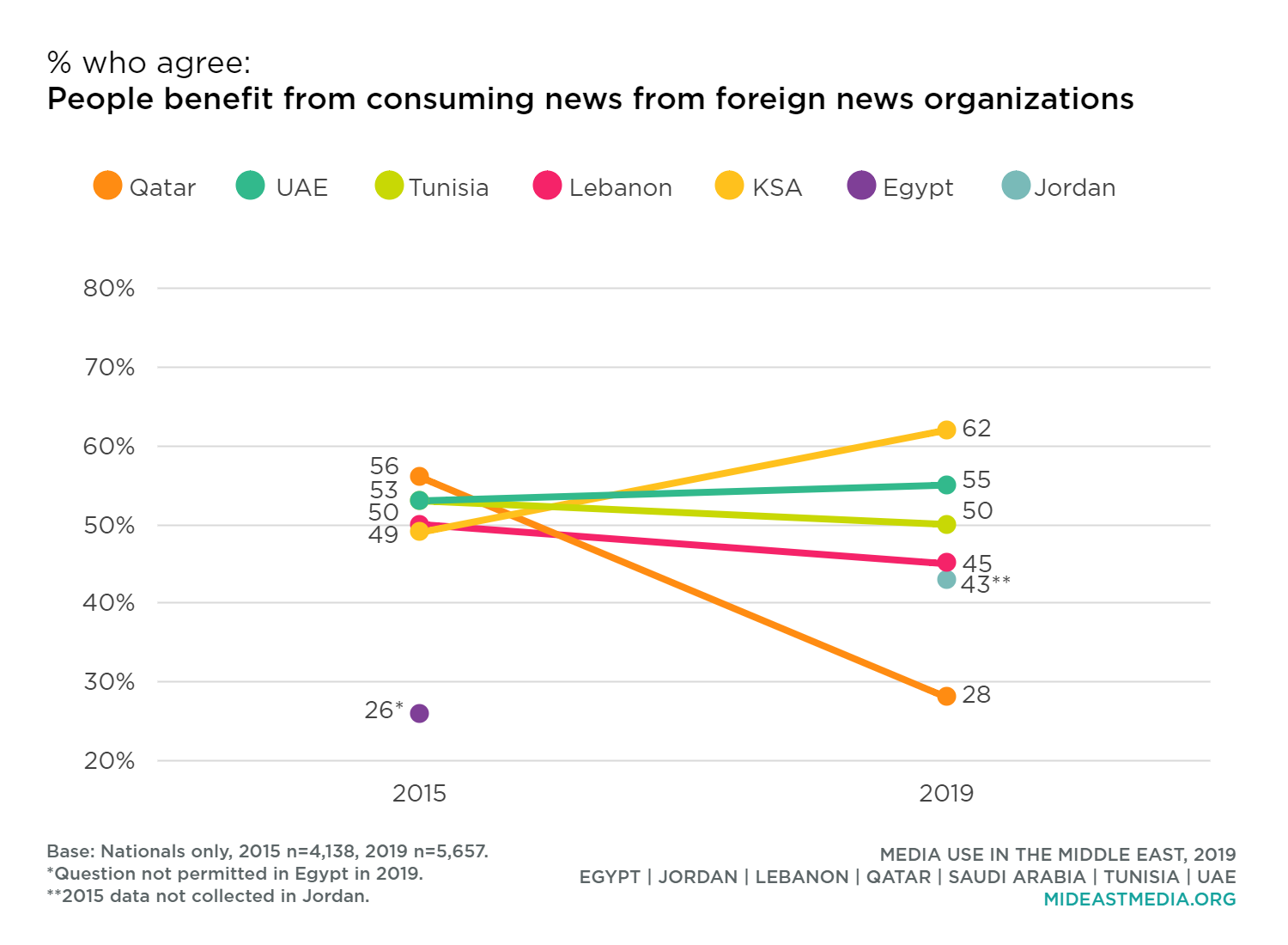Trust in mass media to accurately report the news has been declining in most countries over the past five years. As in 2015, Emiratis and Saudis remain the nationals most likely to trust mass media. This trust, however, dropped most dramatically—by 20 percentage points—to fewer than half of Tunisians and by 10 points among Qataris in the same time period, from 2015 to 2019. This question was not permitted by officials in Egypt in 2019.
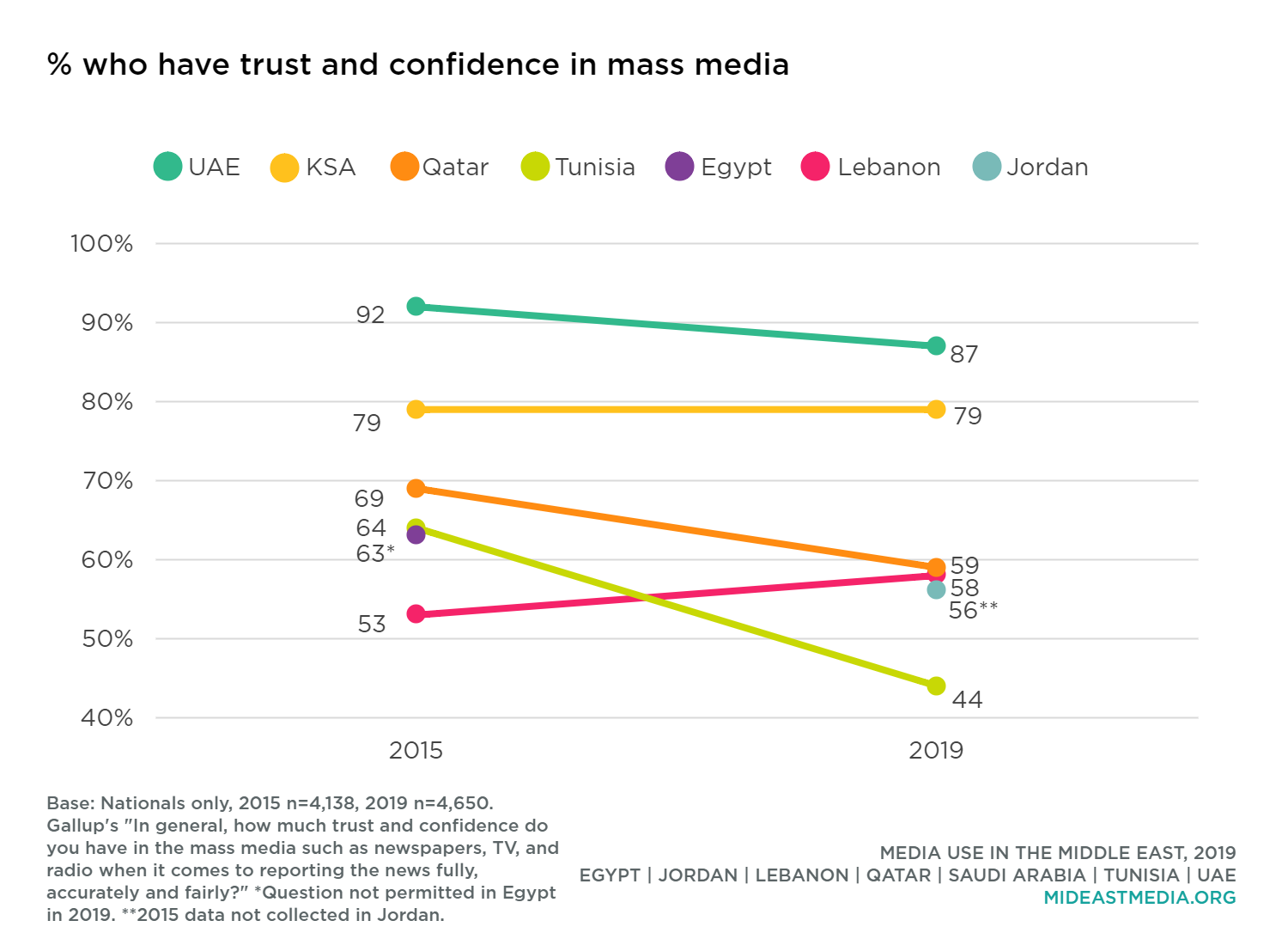
Nationals in all countries are more likely to trust mass media from their own country than media from other Arab or Western countries (61%, 48%, and 49%, respectively). Still, there are some interesting trends at the country level. The proportion of Qataris who say they trust media in Qatar dropped by 12 percentage points from 2017 to 2019, while the share of Qataris who trust Western mass media rose by 10 points in the same period. Additionally, in the UAE and Saudi Arabia, the percentage of nationals who trust Western mass media grew by 22 points and 13 points, respectively, while trust in mass media from their own countries remained stable. Tunisia saw a 12 point drop in trust in national media between 2017 and 2019, and now roughly the same percentage of Tunisians trusts each: national media, mass media from other Arab countries, and Western mass media.
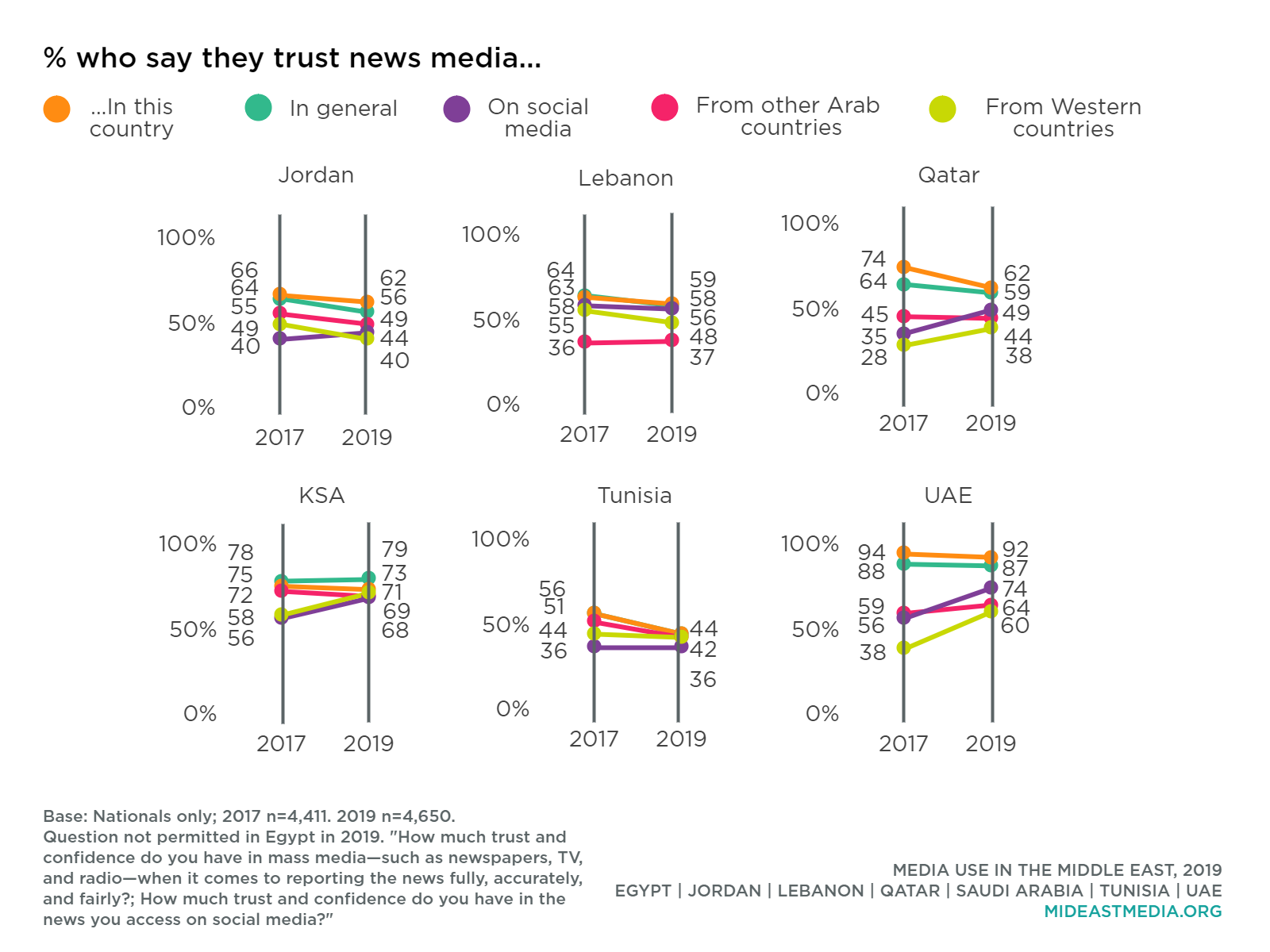
More women respondents trust mass media than do men, including: mass media in general, mass media from their country, and mass media from other Arab countries (trust mass media: 62% women vs. 57% men; media from their country: 63% vs. 58%; media from the Arab world: 50% vs. 46%).
Those who describe themselves as culturally conservative are more likely than those who self-identify as culturally progressive to trust mass media, including: mass media generally, mass media from their own country, and mass media from other Arab countries (trust mass media: 65% conservative vs. 57% progressive; media from this country: 66% vs. 57%; media from the Arab world: 53% vs. 44%).
Percentages of nationals who trust news from social media vary by country, from a high of three-fourths in the UAE to a low of one-third in Tunisia. Notably, public trust in news from social media grew markedly between 2017 and 2019 in the UAE, Qatar, and Saudi Arabia (up 18 percentage points, 14 points, and 12 points, respectively).
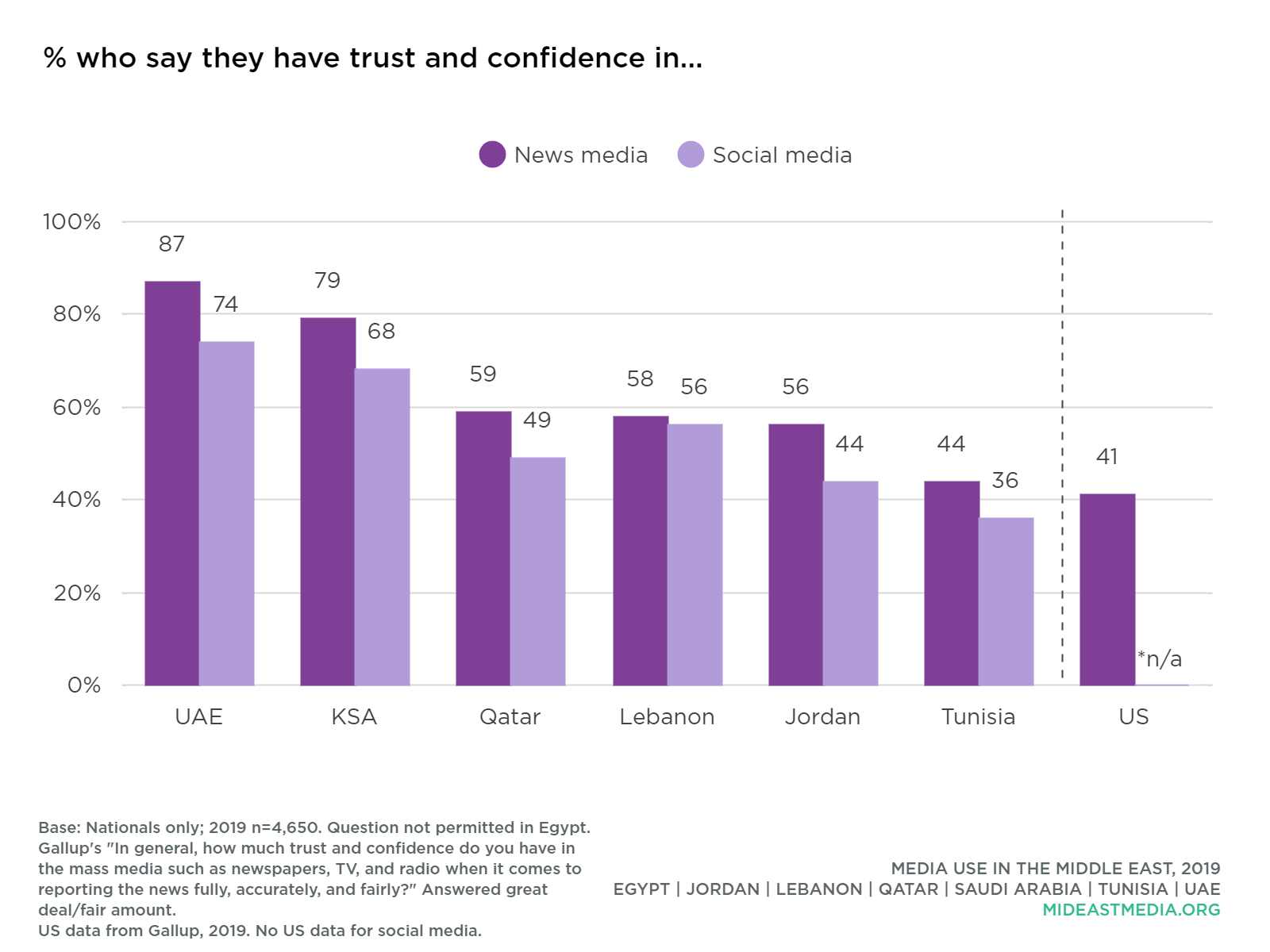
Nationals are more likely than non-nationals to trust any of the categories of mass media, and the widest gap, 20 percentage points, exists for news from social media. Non-nationals trust mass media from the country where they are living at a higher rate than do the nationals themselves, by 13 points across countries on average.
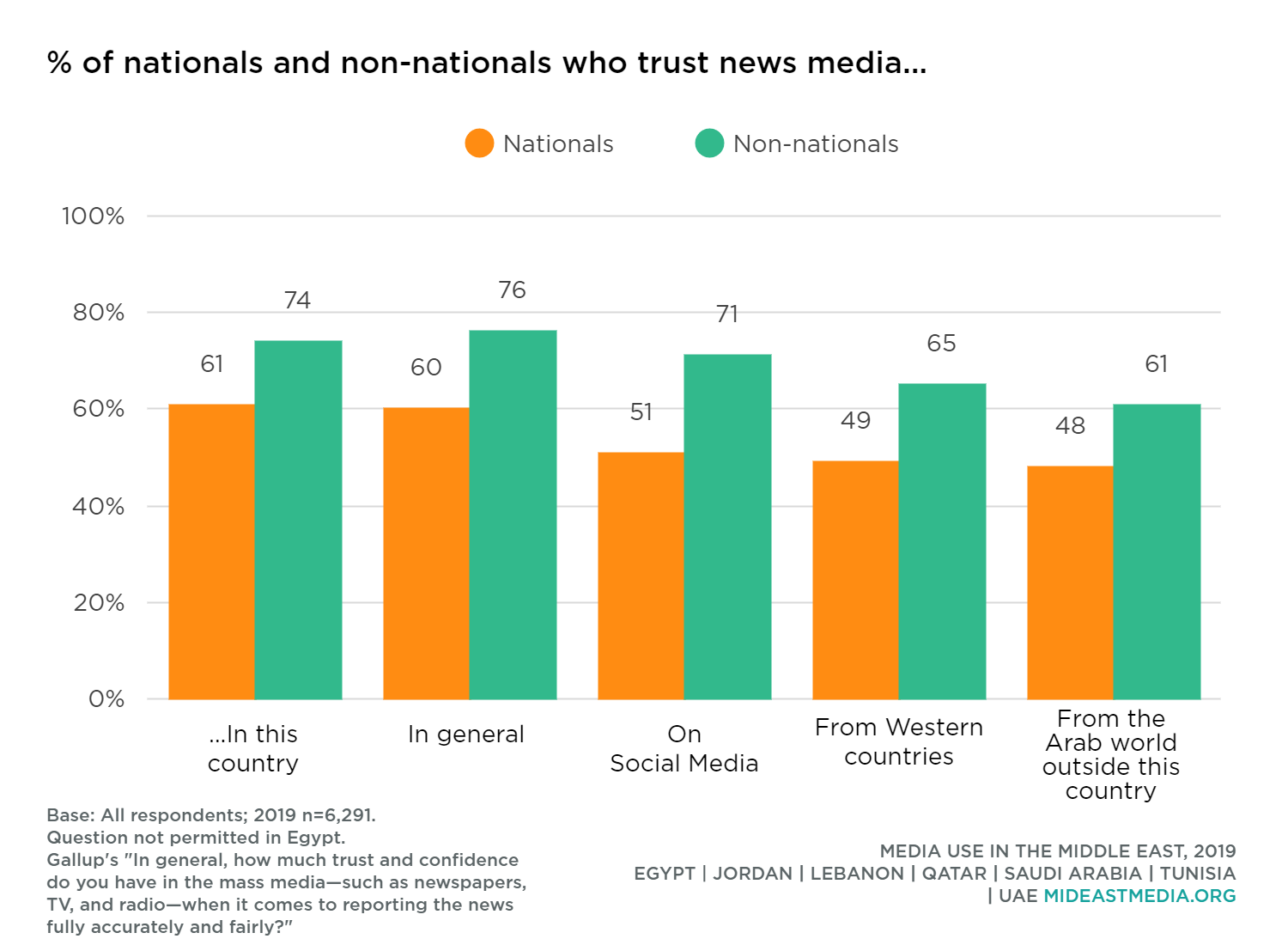
Nearly half of nationals overall say news media in their country are credible and that journalism laws in their country improve the accuracy of news coverage (48% each). Four in 10 overall say media in their country can report news independently without interference from officials (43%). These questions were not permitted in Egypt in 2019.
Perceptions of media credibility and independence vary widely by country. Nationals in Arab Gulf countries in the study are more likely than other nationals to say their country’s news media are credible (77% UAE, 62% KSA, 50% Qatar vs. 42% Jordan, 39% Lebanon, 34% Tunisia). Overall, perceptions of media credibility have not changed much over time, with the exception of Qatar, which saw a spike in perceived credibility from 2017 to 2018 (our first survey after the Saudi-led blockade of Qatar began) followed by a sharp decline in 2019.
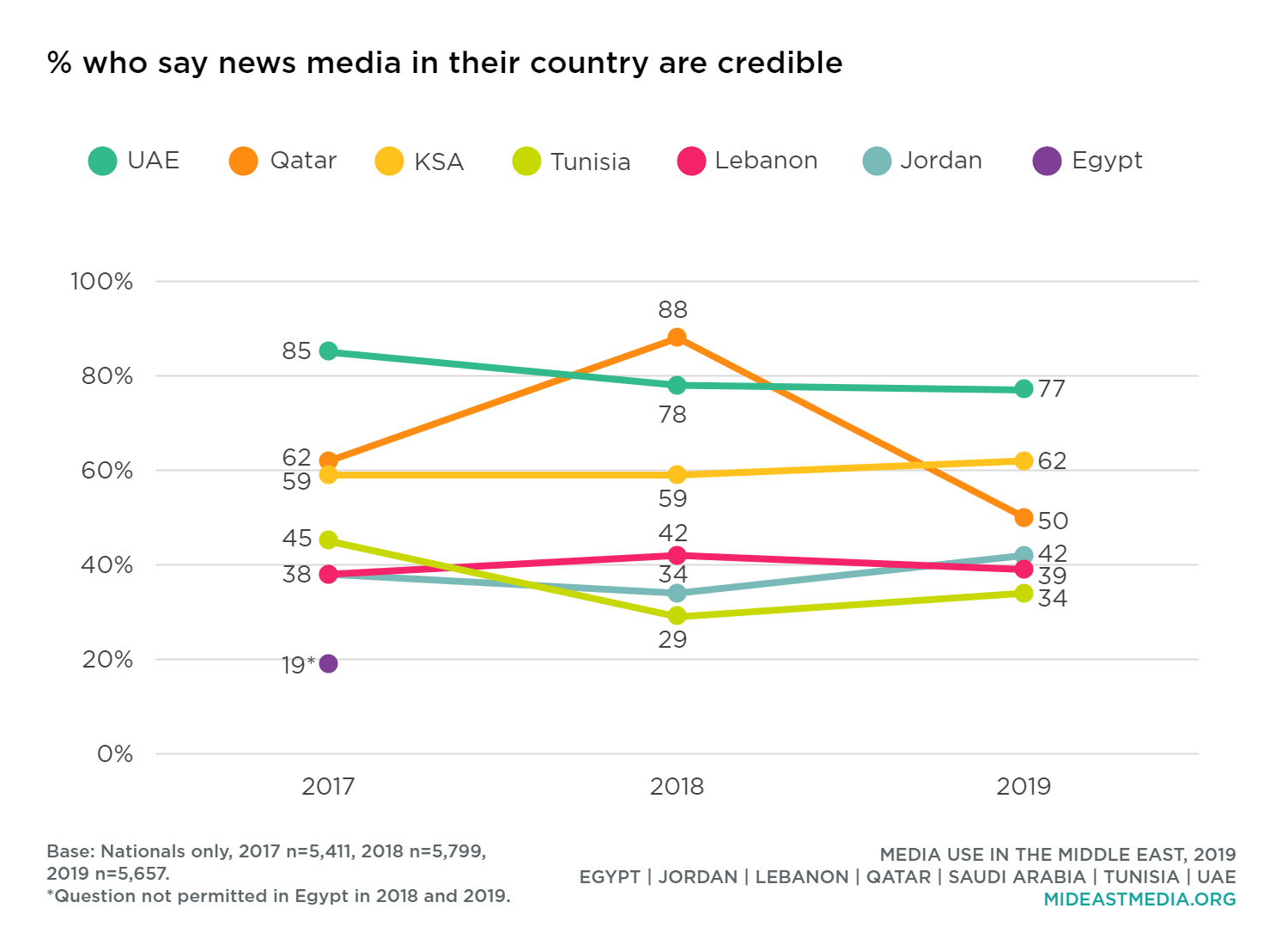
Majorities of Saudis and Emiratis believe news media in their country can report news without interference from officials, whereas only minorities of nationals in the other countries surveyed say the same (60% KSA, 55% UAE vs. 42% Qatar, 39% Jordan, 38% Tunisia, 35% Lebanon). The percentage of nationals who believe news media can report without official interference rose in Saudi Arabia, Jordan, and Qatar (up 11 percentage points, 10 points, and 6 points, respectively).

Seven in 10 Emiratis say laws governing journalism have made it better, as do six in 10 Saudis and half of Jordanians, while less than half of nationals in other countries agree (71% UAE, 59% KSA, 51% Jordan, 47% Lebanon, 41% Qatar, 35% Tunisia). The question was not permitted in Egypt. Compared to 2017, agreement with this statement increased in Jordan and Saudi Arabia but fell in Qatar (Jordan: 34% in 2017 vs. 51% in 2019; Saudi Arabia: 51% in 2017 vs. 59% in 2019; Qatar: 48% in 2017 vs. 41% in 2019).
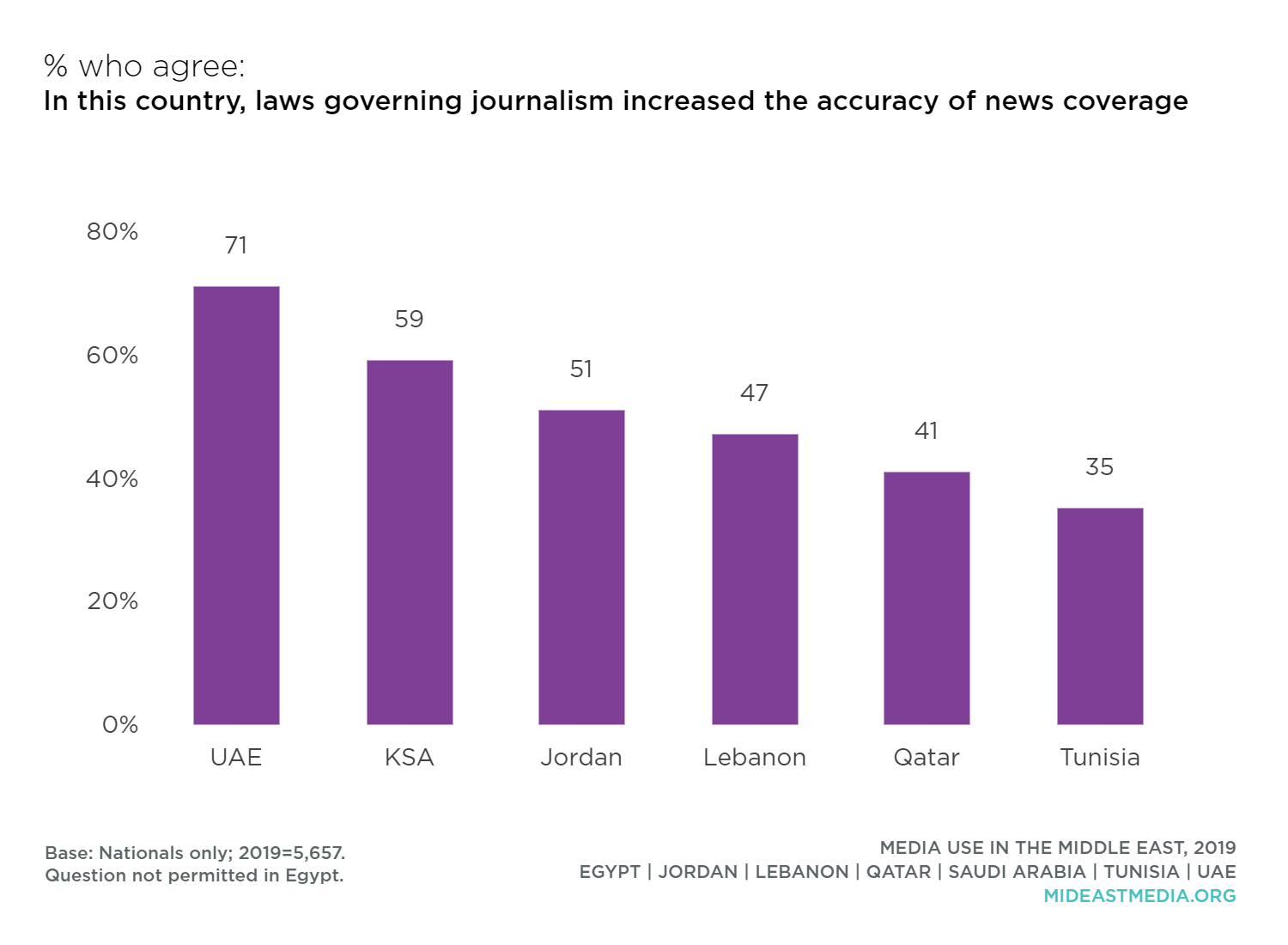
Nationals were asked about any bias by international news organizations either for or against their country, other Arab countries, and the Western world. Nearly half of Emiratis say international news coverage is biased in favor of their country, while only one-quarter of Qataris agree that coverage of Qatar carries a positive bias. Still, only one in 10 Emiratis and Qataris say news coverage is biased against their respective countries. Lebanese are not only the most likely to say international news coverage is biased against their country, but Lebanon is the only country where perceptions of negative international news bias are more common than positive ones. This question was not permitted by officials in Egypt.
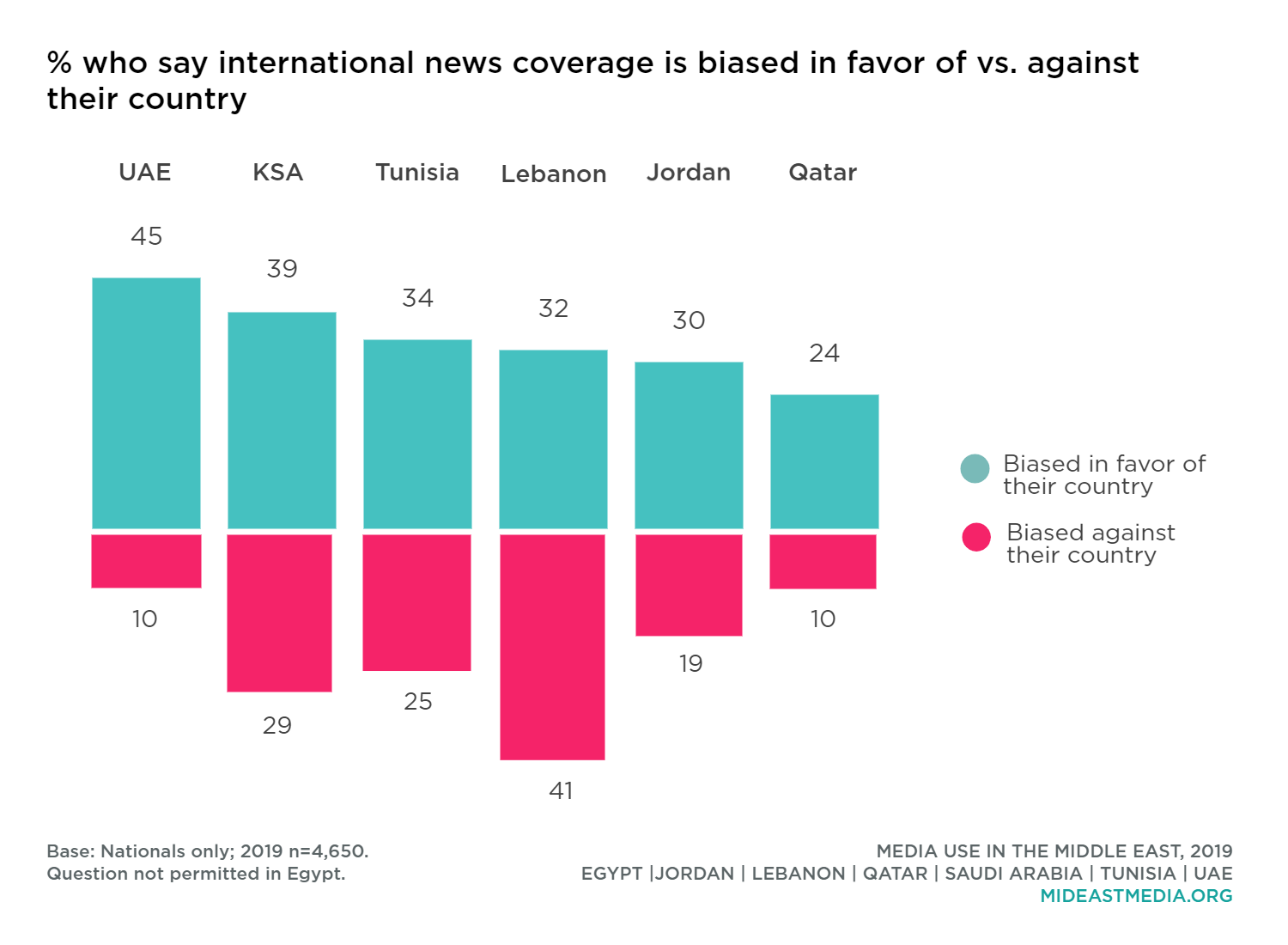
In contrast to 2015, a greater proportion of Saudis in 2019 believe international news coverage is biased in favor of their country as opposed to against their country (biased in favor: 17% in 2015 vs. 39% in 2019, biased against: 38% in 2015 vs. 29% in 2019). Lebanese in 2019 are more likely to say international news coverage is biased toward Lebanon than in 2015 and slightly less likely to say such coverage demonstrates anti-Lebanon bias (biased in favor: 26% in 2015 vs. 32% in 2019; biased against: 48% in 2015 vs. 41% in 2019).
While Lebanese are the most likely to say international news coverage is biased against both their country and the Arab world, they are also more likely than other nationals to say coverage is biased toward Western countries. Compared to all other nationals, Qataris are least likely to perceive negative international news bias, whether it be against their country, against the Arab world, or against the Western world.
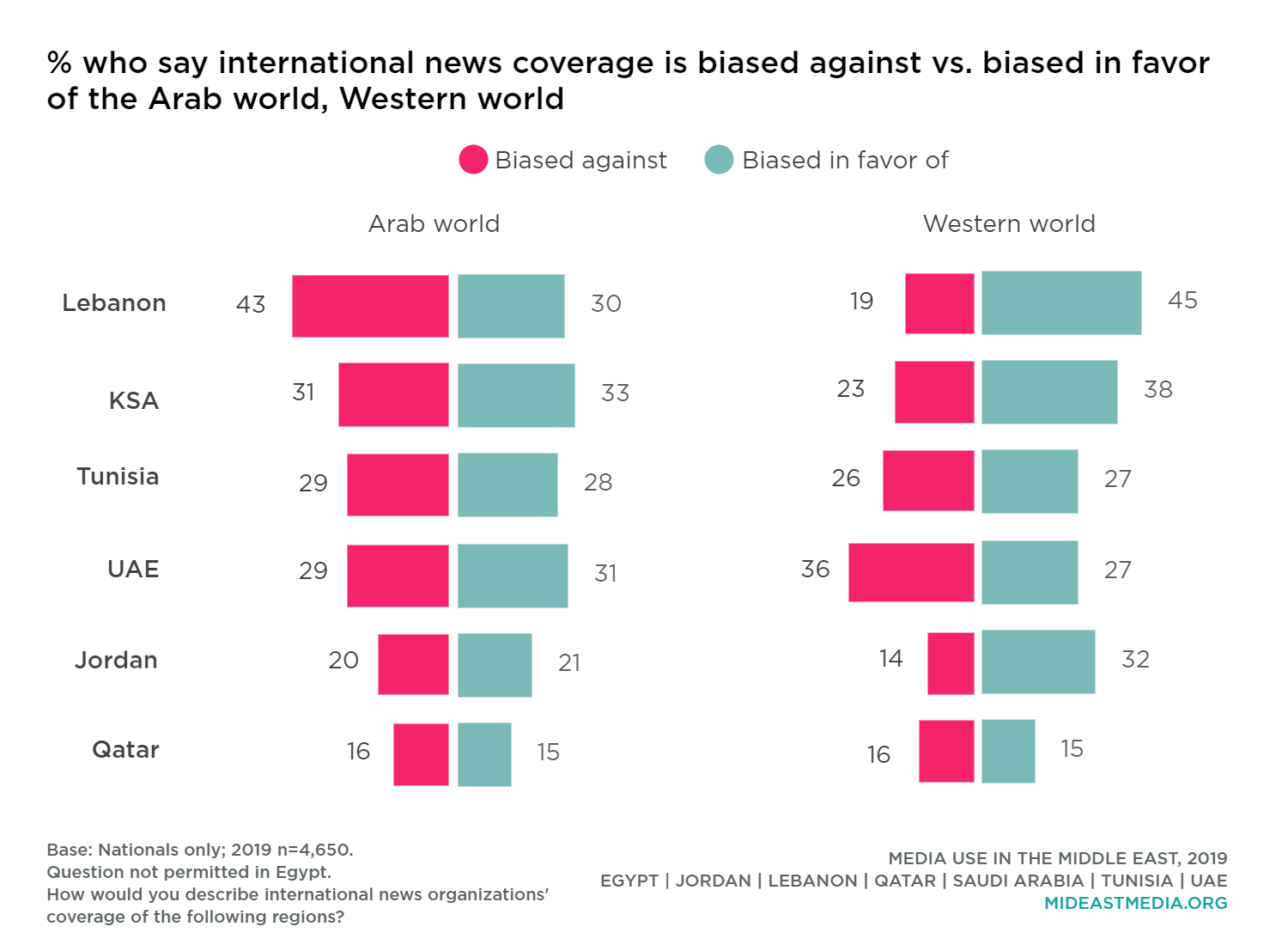
Compared to 2017, more Tunisians, Lebanese, Qataris, and Emiratis now believe international news outlets’ coverage favors the Arab world.
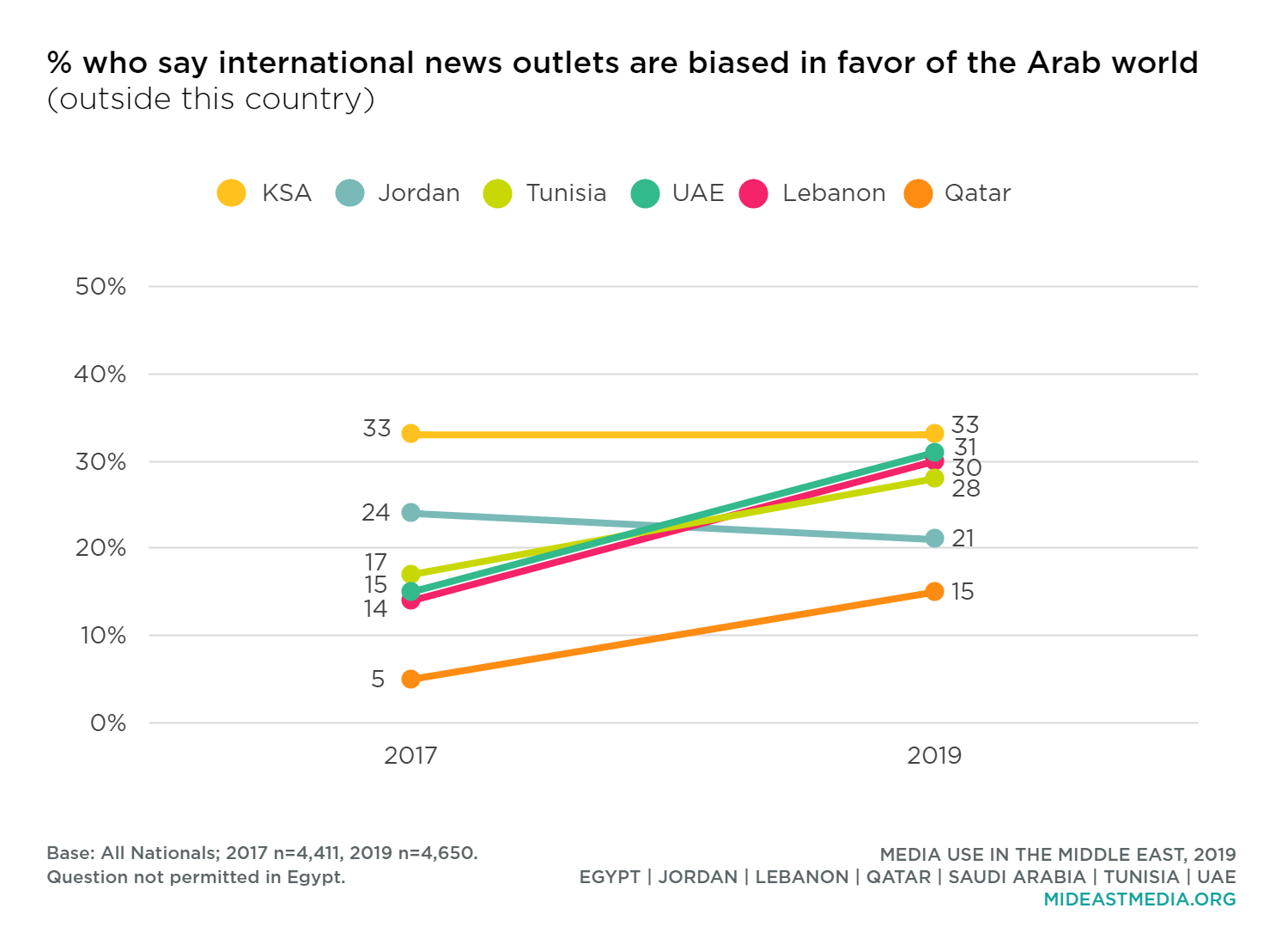
A robust number of nationals in most countries—four in 10 or more—say people benefit from consuming news from foreign news organizations. Of note, six in 10 Saudis perceive benefits to consuming foreign news, a figure that has increased since 2015 (49% in 2015 vs. 62% in 2019). The exception is Qatar, which has been confronted by fake news assaults from Saudi Arabia, the UAE, Egypt, and other countries; just 28% of Qataris see benefits to consuming foreign news, half of what that figure was in Qatar in 2015 (56% in 2015 vs. 28% in 2019).
